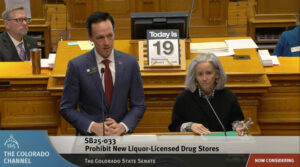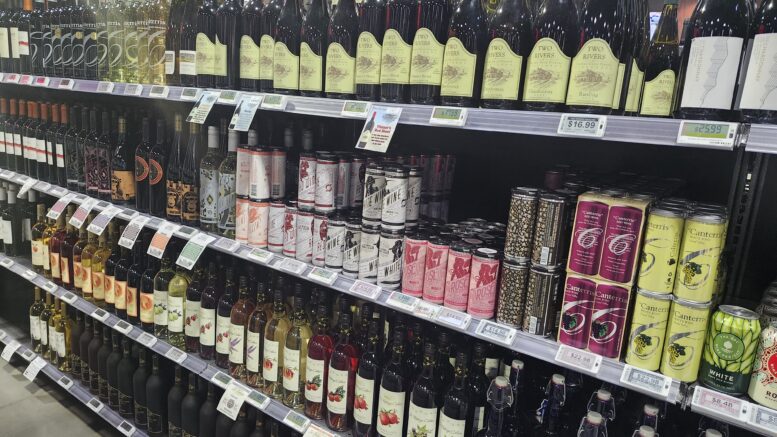The era of grocery stores adding full alcohol sales to their premises appears to be over.
Gov. Jared Polis on Thursday signed into law Senate Bill 33, which ends the nine-year practice of allowing grocers to buy out the licenses of two nearby liquor stores and add spirits to the beer and wine they can sell at all locations. And by getting overwhelming bipartisan support in both legislative chambers and avoiding a veto by the previously skeptical Democratic governor, the bill completes a remarkable turnaround from last session, when it died in a Senate committee.
The success this year of the bill was due in large part to sponsoring Democratic Sens. Judy Amabile of Boulder and Dylan Roberts of Frisco narrowing its scope significantly from the failed effort in 2024. While that bill proposed limits on where grocers could display alcohol and caps on the amount of alcohol in malt-based products and originally would have invalidated the licenses for full alcohol sales at groceries, SB33 does one thing — stops grocers from buying out further liquor-store licenses in order to add full alcohol sales.
That buyout provision came about as part of the 2016 “Grand Compromise.” At the time, grocers were relegated to selling low-strength beer and barred from selling wine and spirits at all but one Colorado location in their chains, and reform advocates proposed a ballot initiative to end the prohibition on beer and wine sales. Seeking compromise, then-Gov. John Hickenlooper signed a measure that allowed full-strength beer sales in all grocery and convenience stores beginning in 2019 and allowed full liquor sales with the two buyouts.
Brokered deal fell apart, liquor stores say
Just six years later, though, grocers funded a successful ballot measure that permitted them to sell wine at all locations — a change that liquor-store owners said violated the deal. Since grocery wine sales began in 2023, many liquor store owners have stories like the one Argonaut Wine & Liquor President Josh Robinson told to the House Business Affairs & Labor Committee last month — annual sales drops of 11% to 15% and a 33% reduction in staff.
“The grocers did not keep to their agreed-upon compromise,” said Jason Gordon, co-owner of The Liquor Store in Montrose.

Colorado state Rep. Naquetta Ricks speaks over a video call to the Colorado Chamber of Commerce Labor & Employment Council in February about Senate Bill 33.
Advocates for SB 33, like cosponsoring Democratic Rep. Naquetta Ricks of Aurora, said it’s needed to preserve liquor stores, which are largely locally owned and serve as incubators for small breweries and distilleries who can’t get products into national grocery chains. Robinson testified that 10% of Colorado’s roughly 1,600 liquor stores closed in 2024 and warned that 400 to 600 more have said they are in danger of shuttering in the next year.
Grocery stores say they played by rules
Retailers, large spirits makers and a consumer group pushed back, however, by noting that grocers have acted within the bounds of the state law and have helped to change it with the help of voters because state residents are calling for more consumer choice. More than 30 other states allow full alcohol sales in grocery stores, and no other state has pulled back on that allowance before now, noted Ainsley Giglierano, vice president of public affairs and state policy for the Distilled Spirits Council of the United States.
Chris Howes, president of the Colorado Retail Council that represents large grocers, noted that the 2016 has led to the buyouts of 70 independently owned liquor stores, sometimes at significant prices — including one chain spending $12 million on license acquisitions. Sen. Larry Liston, a Colorado Springs Republican who was the most vocal legislative opponent of the bill, noted that even after 36 grocers added full alcohol sales since 2016, there were 1,587 liquor stores operating at the end of 2024, owners of which could plan to sell stores for a retirement payout under the existing law.
“Should this bill pass, there will be no more buyouts,” Liston said during Senate debate on Feb. 20. “That will end their ability to have a King Soopers or a Safeway or whoever come in and say, ‘Here’s a million dollars for your business.’ That will end forever.”
Changes to bill won numerous supporters

Colorado state Sens. Dylan Roberts and Judy Amabile explain Senate Bill 33 to their chamber in February.
Roberts, however, noted that since legalization of grocery wine sales two years ago, only two such buyouts have occurred, and he said that their ability to sell wine as well as beer effectively ends their need to pay for licenses to get that extra product line.
Several legislators who backed SB 33 as it passed the Senate by a vote of 28-5 and the House by a margin of 55-8 noted that its narrower focus, which doesn’t change current practices but bars only future buyouts, convinced them the bill is the right way to go. Republican Rep. Max Brooks of Castle Rock said after the House committee hearing that he was prepared to oppose the bill but changed his mind after local stores’ testimony convinced him that legislators “need to be a champion for small business.”
“I opposed this in the House last year because it would have taken licenses away from groceries,” first-year Republican Sen. Lisa Frizell of Castle Rock said during debate in her chamber. “I look at this bill this year as a good compromise from where we were last year because nobody’s losing the investment that they’ve made … but it also provides some protections to those small mom-and-pops.”
Polis signed the bill quietly on Thursday, mentioning it becoming law only at the bottom of a news release about several unrelated public-safety bills he also had inked. The new prohibition on grocers adding full-alcohol-sales licenses is set to take effect on Aug. 6.
